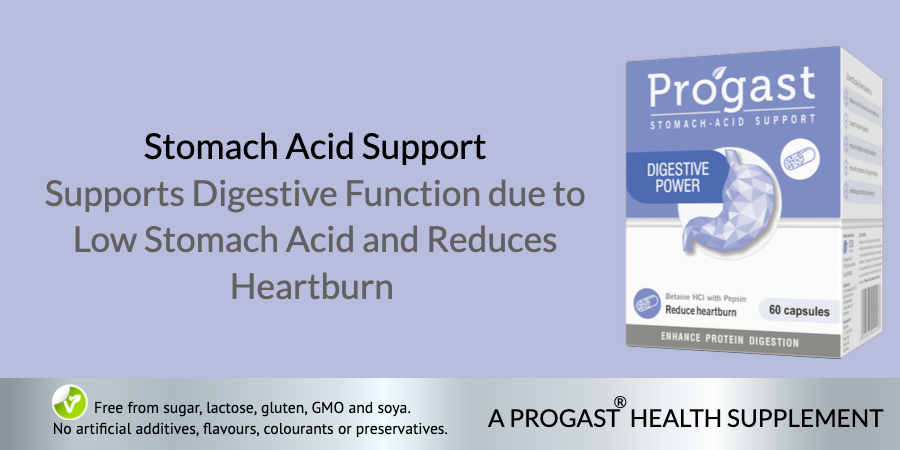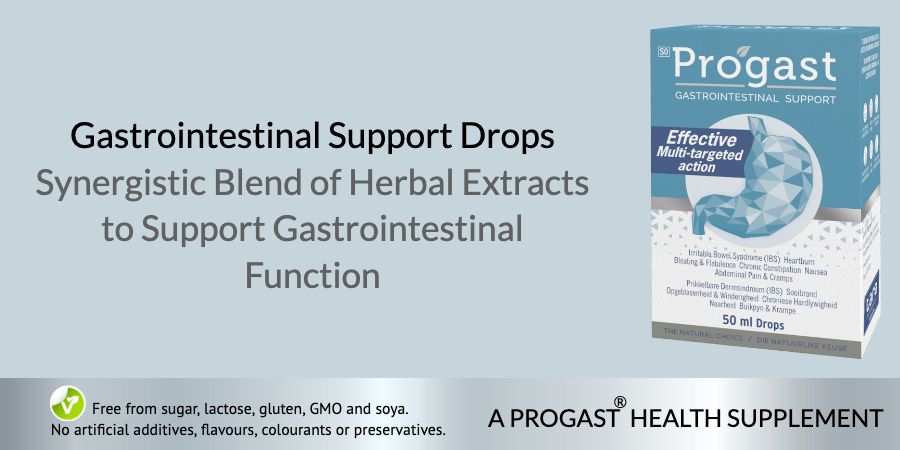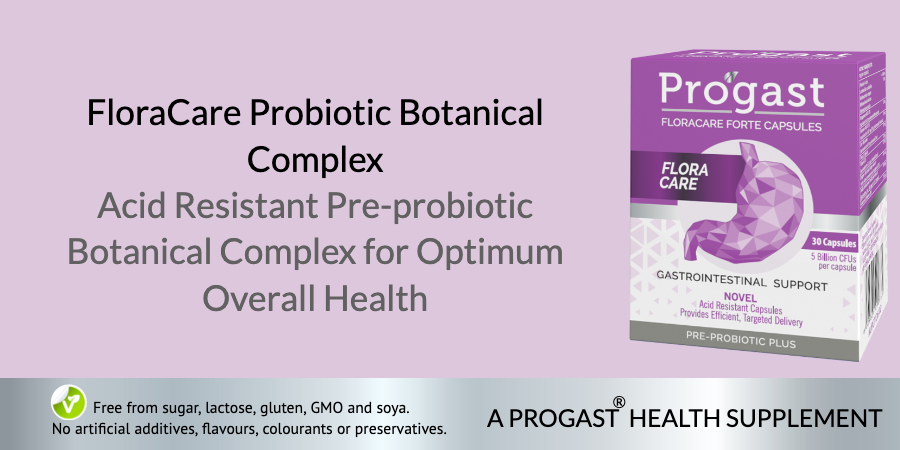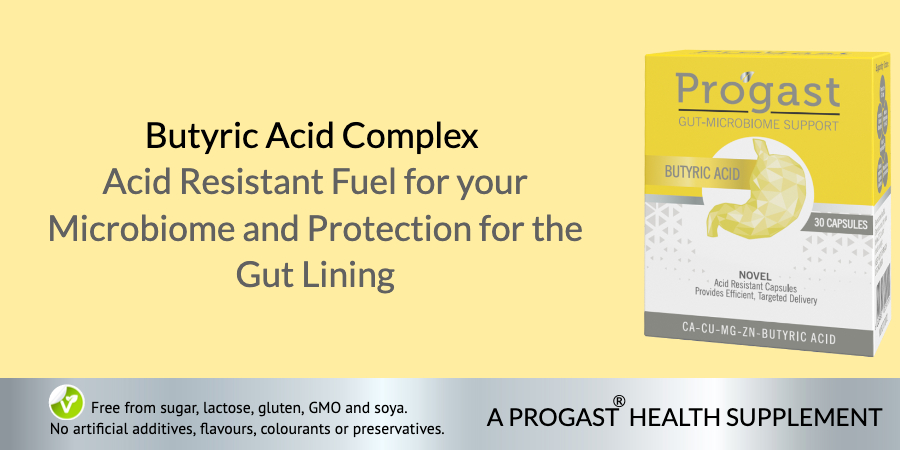Progast® FloraCare Drops
Progast® FloraCare Drops – the only remedy of its kind on the shelves today containing L. reuteri (from human origin), Vitamin D3 and Zinc picolinate. Scientifically formulated in a vitamin E oil-based liquid, FloraCare Drops is particularly beneficial and safe for use by pregnant and breastfeeding mothers, infants and babies.
The gut is the centre of our immune system and a healthy gut prevents various common gut conditions (specifically in infants). These conditions include colic, chronic constipation, wind, diarrhoea, acid reflux and urogenital infections.
Especially important during antibiotic therapy, FloraCare Drops may help to restore and optimise the gut flora and to improve immune function. Evidence supporting health claims for probiotic products varies widely. Always ensure that the claim match the probiotic strain.
Benefits:
- Supports immune function
- Assists in the healthy development of bones and teeth
- Restore gut flora during antibiotic therapy
- Shortens the duration of respiratory tract infections
- Prevents chronic constipation by increasing gut transit time
- Supports healthy gut development in newborns
- Reduces the symptoms and duration of colic
Positive effect on infants and babies
The mother transfers microorganisms to her baby during pregnancy, delivery and lactation, and the mother’s diet and microbiota can influence that of her baby. Pre-term birth, Caesarean section, formula feeding, antibiotic use, and malnutrition have been linked to dysbiosis (a disrupted gut microbiome) which in turn is associated with inflammatory bowel diseases, colic and allergies.
Recent reports have suggested that gastroesophageal reflux disease (GERD) is linked with a 1.7 times higher incidence of cow’s milk sensitisation in children.1 The benefits of probiotic administration during pregnancy, lactation and early life should not be underestimated or ignored.
Zinc is an essential mineral and required for normal growth and development and function of immune cells. The addition of vitamin D (essential for the developing immune system) may help with the development of healthy bones and teeth.
Antibiotic-associated diarrhea (AAD)
ADD occurs when antibiotics disturb the natural balance of ‘good’ and ‘bad’ bacteria in the intestinal tract causing harmful bacterial growth. Probiotics, and specifically the strain we use (L. reuteri) may reduce the incidence of AAD.2,3
Prevention and treatment of allergies, allergic skin reactions and eczema
Supplementing with a probiotic before and after birth, could reduce the risk of food hypersensitivity in young children, according to a systematic review and met-analysis of various trials.4 Probiotics may prevent a form of allergy in which eczema or asthma may occur in a part of the body not in contact with the allergen.
We see a rise in inflammatory diseases, the ‘allergy epidemic’ in babies and young children. A healthy digestive tract is critical for normal immune development, as is vitamin D. Many studies have been conducted and found various positive results such as improved microbial composition, intestinal maturation, decreased ‘bad’ bacterial load and infections, and improved immune response. Probiotic, prebiotic and synbiotic interventions in early life can be envisaged for disease prevention in both a healthy baby and a baby at risk of chronic disease.5
The management of colic
In a study to show if probiotics administration is beneficial in babies with colic, daily drops of L. reuteri mixed with oil, or just an oil mixture was given to infants born at full term. Parents were asked to keep diaries recording vomiting episodes, bowel movements and episodes of inconsolable crying (all associated with colic). According to head researcher Dr. Flavia Indrio from the University of Bari Aldo Moro, Italy: ‘After three months, the average duration of inconsolable crying per day was 38 minutes for those infants who received probiotics versus 71 minutes for those who received the placebo; the average number of regurgitations per day was 2.9 for those who received probiotics versus 4.6 for those who received the placebo; and the average number of bowel movements for those that received probiotics was 4.2 versus 3.6 for those that received the placebo.’6
Some say colic is due to gut inflammation. Research7 shows that colicky babies have more gas-producing bacteria than non-colicky infants who have more anti-inflammatory bacteria that live in the vaginally canal. Vaginal delivery carry these health benefits but all is not lost should a caesarean birth be necessary. Liquid probiotics can be placed on the nipple or on babies lips before feeding.
A study was done on 105 infants diagnosed with colic, to receive either a probiotic (L. reuteri, 100 CFU [the quantity in FloraCare Drops]) with vitamin D3 supplements or vitamin D3 supplements alone. Results showed a significant reduction in pain-relieving medication use and less crying among the group receiving probiotics and vitamin D3 supplementation.8
For more on colic, visit our conditions page.
Supports the immune system
Probiotic supplementation can significantly reduce the duration of respiratory tract infection in young children at both 3 and 6 months old.9 Vitamin D and Zinc deficiency may be one of the primary reasons for susceptibility of cold and flu viruses.
Positive effect on pregnant and breastfeeding mothers
Pregnant and breastfeeding women need higher levels of probiotics, zinc and vitamin D. Zinc has been found to enhance the effects of vitamin D on bone health. Vitamin D is fat-soluble so its absorption depends on the gut’s ability to absorb dietary fat. Probiotic supplementation will restore gut health.
Research indicates that inadequate zinc status increases the risk of pregnancy complications. Even mild zinc depletion in expecting mothers has been associated with growth retardation in the uterus.
Anxiety and Depression
Inflammation of the gut have been linked to several mental illnesses, including anxiety and depression – the most common mental health problems in pregnancy. Probiotic supplementation show real promise for anxiety symptoms and depression, as part of natural lifestyle interventions. Probiotics are very safe to take during pregnancy and breastfeeding. If you are dealing with anxiety and depression, please consult your doctor.
Psychobiotics is an exciting new area of research on probiotics and their potential to restore normal microbial balance, positively effecting hormonal and mental health. The extensive bidirectional communication network between the gastrointestinal tract and the central nervous system, is referred to as the ‘gut–brain axis.’
Hormones Balance Begins in the Gut
The gut microbiome may be the most important organ of the endocrine system and regulates your hormones. Hormonal balance is dependent on good gut and microbial health. The gut microbiome doesn’t just influence the production of hormones, the bacteria actually determines the creation and release of each hormone!10 The microbiome actually synthesises one of the three main forms of oestrogen, known as oestriol, whilst also balancing overall oestrogen levels.
Vaginal and Bladder Health
A healthy vaginal microbiota is dominated by the probiotic species Lactobacillus. Lack of Lactobacillus can cause vaginal discomfort, thrush (candida)11 and even bladder infection.
Furthermore, Lactobacillus modulates immune response, metabolizes glycogen to produce lactic acid and maintains a low vaginal pH, keeping pathogens at bay. Lactobacillus are displaced from the vagina by inflammation-causing pathogens that can increases risk of preterm labour.12
Gut Health
The gut accounts for 25% of the immune cells in the body that provides 50% of the body’s immune response.13
Dietary fiber is important to prevent constipation, especially in pregnancy. Many people struggle with the unpleasant effects from fermentation of indigestible residues. The key is to increase your fibre intake gradually. Probiotics can improve tolerance and ease this transition to a healthier diet rich in plant-based foods. As we learn more about the microbiome and the probiotics inhabiting it, the benefits are clearly way beyond mere gut health.
Our ingredients have a synergistic effect. See our ingredients page for more on the actives and their mechanism of action.
Ingredients:
| Lactobacillus reuteri, (strain 1E1) | 100 million (1 x 108) live, freeze dried Colony Forming Units (CFU) |
| Vitamin D3 (400 IU) | 10.000 µg |
| Zinc picolinate | 20 mg |
Dosage and directions for use:
| Infants under 1 year: | 3 drops (0.1 ml) under the tongue once daily. |
| Children aged 1 year to 18 years: | 5 drops (0.2 ml) under the tongue once daily. |
| Adults: | 5 drops (0.2 ml) under the tongue once daily or as recommended by your healthcare provider. |
Shake the bottle well before use. To dispense, turn the bottle at an 45 degree angel and the drops will form slowly. The drops may be given in the mouth, under the tongue, on a spoon, on the babies lips or on the mothers nipples. Do not add the drops to hot food or drink as heat may damage the live cultures.
During antibiotic therapy, the product should be taken at least 3 hours after administration of the antibiotic (i.e. in the interval between doses). Take the recommended dose twice daily during antibiotic therapy.
Store in a cool dry place at or below 25 degrees Celsius. The bacteria in FloraCare grow and thrive and survive at room temperature. FloraCare does not need to be refrigerated. Use within 3 months.
View Progast® FloraCare Drops Packaging Leaflet
Side effects and warnings:
None known, however it is important to ensure that your child’s medical professional is aware of the use of this product. Please note: Sleep may follow naturally after relief.
Vegan friendly. Free from sugar, lactose, GMO, gluten and soya. No artificial additives, flavours, colourants or preservatives. Produced in a GMP and ISO 9001 facility with the highest international standards of safety, hygiene and quality control.
References:
- Farahmand et al: Cow’s milk allergy among children with gastroesophageal reflux disease. Gut Liver. 2011;5(3):298-301.
- Guo Q, Goldenberg JZ, Humphrey C, El Dib R, Johnston BC. Probiotics for the prevention of pediatric antibiotic-associated diarrhea. Cochrane Database Syst Rev. 2019;4(4)
- Diarrhoea Eom T-H, et al. The therapeutic effect of Lactobacillus reuteri in acute diarrhea in infants and toddlers. Korean J Ped.2005;48:986-989.
- Zhang GQ, Hu HJ, Liu CY, Zhang Q, Shakya S, Li ZY. Probiotics for Prevention of Atopy and Food Hypersensitivity in Early Childhood: A PRISMA-Compliant Systematic Review and Meta-Analysis of Randomized Controlled Trials. Medicine (Baltimore). 2016;95(8).
- Miraglia del Giudice M. Maiello N. Decimo F, et al. Airways allergic inflammation and Lactobacillus reuteritreatments in asthmatic children. Journal of Biological Regulators & Homeostatic Agents.2012; 26(1S):35-30.
- Slomski A. Prophylactic Probiotic May Prevent Colic in Newborns. JAMA. 2014;311(8): 790.
- Daelemans S, Peeters L, Hauser B, Vandenplas Y. Recent advances in understanding and managing infantile colic. 2018;7:F1000
- Savino F, Ceratto S, Poggi E, Cartosio ME, Cordero di Montezemolo L, Giannattasio A. Preventing effects of oral probiotic on infantile colic: a prospective, randomised, blinded, controlled trial using Lactobacillus reuteri DSM 17938. Benef Microbes. 2015;6(3):245-251.
- Agustina R, Kok FJ, van de Rest O, et al. Randomized trial of probiotics and calcium on diarrhea and respiratory tract infections in Indonesian children. 2012;129(5).
- Sara Gottfried MD Balance Your Hormones By Stabilizing Your Gut.
- Chew, S. Y., Cheah, Y. K., Seow, H. F., Sandai, D. & Than, L. T. L. Probiotic Lactobacillus rhamnosus GR‐1 and Lactobacillus reuteri RC‐14 exhibit strong antifungal effects against vulvovaginal candidiasis‐causing Candida glabrata isolates. Journal of Applied Microbiology. 2015(118):1180–1190.
- Reid G, Kirjaivanen P. Taking probiotics during pregnancy. Are they useful therapy for mothers and newborns? Can Fam Physician. 2005;51(11):1477-1479.
- Palmer S. Research Suggests Beneficial Bacteria May Support Immune Health. Today’s Dietician. 2011;13(1):20.













